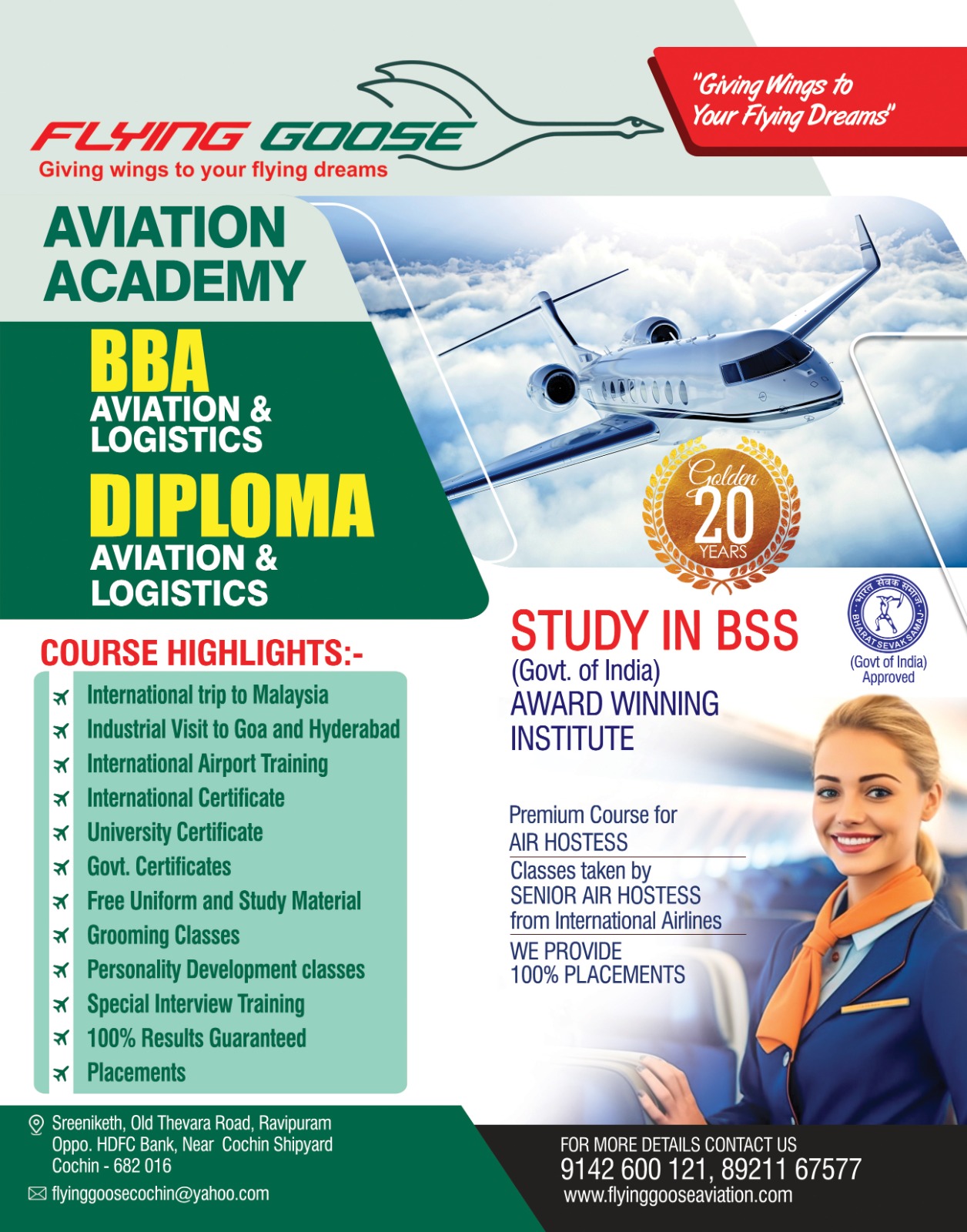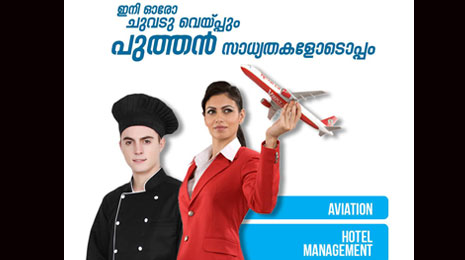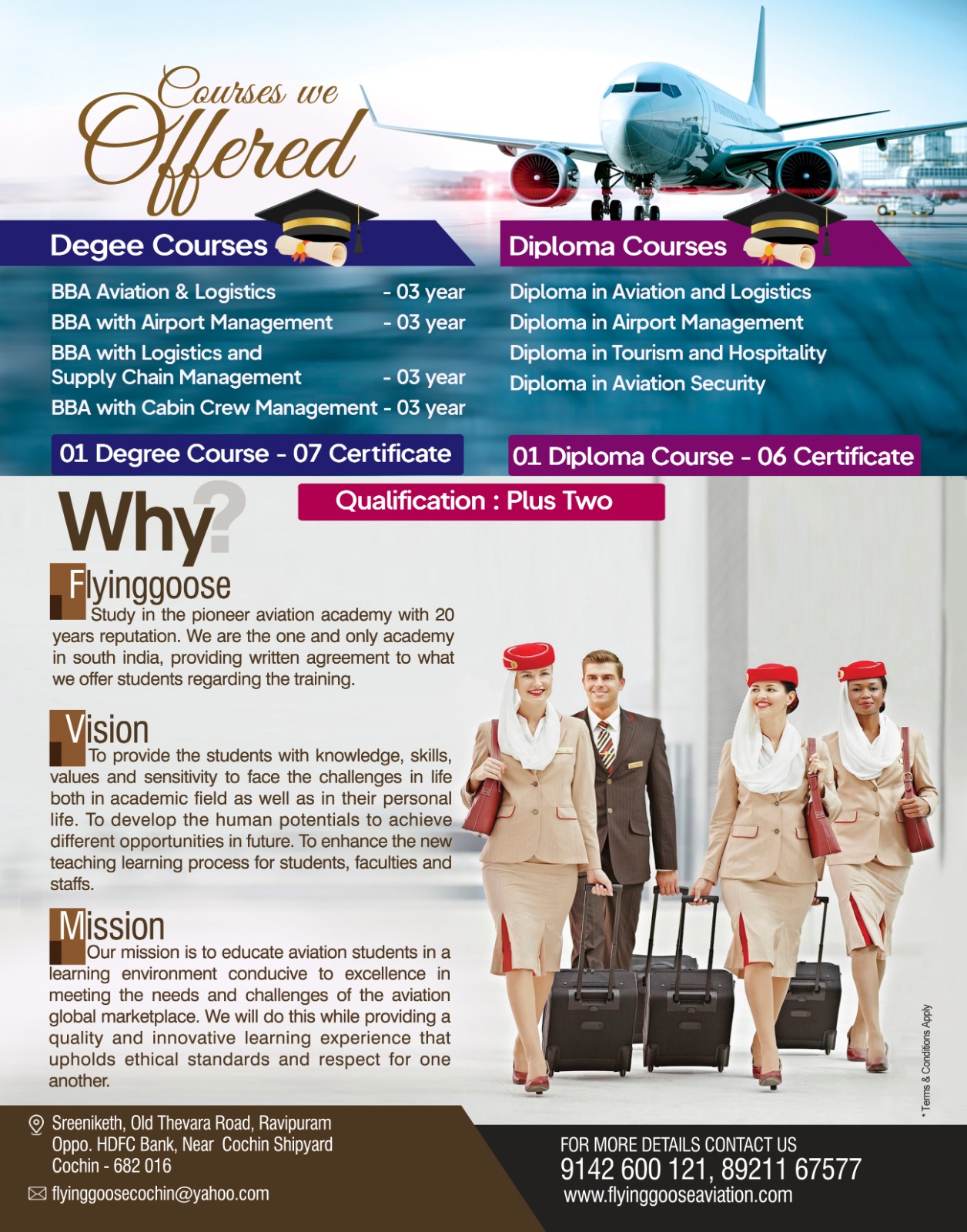Flying Goose Aviation Academy
Ravipuram - Ernakulam
Products & Services:
Flying Goose Aviation Academy, Ravipuram, Ernakulam, Reviews, Contact number, Phone number, Address, More..
Since : 2004
Ravipuram - Ernakulam
Products & Services:
Flying Goose Aviation Academy, Ravipuram, Ernakulam, Reviews, Contact number, Phone number, Address, More..
Since : 2004
A Diploma in Cabin Crew Management is a specialized program designed to train individuals for careers as flight attendants and other cabin crew positions. The course equips students with the necessary skills, knowledge, and demeanor required to provide excellent customer service and ensure passenger safety during flights. This diploma covers various aspects of cabin crew duties, including safety procedures, in-flight services, communication skills, and emergency response.
Ernakulam, a key commercial and educational hub in Kerala, offers several reputable institutions providing diplomas in cabin crew management. These programs are designed to meet the growing demand for trained cabin crew professionals in the aviation industry. Notable institutions in Ernakulam include the Frankfinn Institute of Air Hostess Training, Airborne Academy, and Speedwings Aviation Academy. These institutes offer a range of courses that cater to both fresh graduates and working professionals looking to enter or advance in the aviation sector.
The programs available in Ernakulam are known for their comprehensive curriculum and practical training components. They offer flexible learning options such as full-time, part-time, and weekend classes to accommodate the diverse needs of students. Many institutes also provide placement assistance and have strong ties with leading airlines, enhancing job prospects for graduates.
Students expect a diploma program that provides a thorough and comprehensive curriculum. Key areas of study typically include aviation safety and security, in-flight services, passenger handling, grooming and presentation, communication skills, and first aid. A well-rounded curriculum ensures that students are well-prepared to handle the responsibilities and challenges of a cabin crew role.
The presence of experienced and qualified faculty members is a crucial expectation. Students look for programs where instructors have extensive industry experience and relevant academic qualifications. Experienced faculty can provide valuable insights into the aviation industry, practical training, and mentorship, which are essential for the professional development of students.
Practical training is a significant component of cabin crew management programs. Students expect hands-on training in simulated environments that replicate real-flight conditions. This includes emergency drills, in-flight service training, and communication exercises. Practical training ensures that students gain the confidence and skills needed to perform effectively in their roles.
Institutes with strong industry connections and a good track record of student placements are highly preferred. Partnerships with airlines and aviation companies facilitate internships, on-the-job training, and job placements for students. Placement support services, such as resume building, interview preparation, and career counseling, are also important for students looking to start their careers in aviation.
State-of-the-art facilities and resources are important for providing a high-quality learning experience. Students expect access to modern classrooms, training simulators, grooming labs, and other essential resources. Institutes that invest in advanced training facilities create an environment conducive to effective learning and skill development.
Typically, candidates need to have completed higher secondary education (12th grade) to enroll in a diploma program in cabin crew management. Good communication skills, a pleasing personality, and basic proficiency in English are usually required. Some institutes may also have specific age and height criteria, as well as fitness standards.
The duration of a diploma program in cabin crew management generally ranges from 6 months to 1 year, depending on the institute and the specific course structure. Some programs may offer accelerated options or allow students to extend the duration if they are studying part-time.
Graduates of cabin crew management programs can pursue various roles in the aviation industry, primarily as flight attendants or cabin crew members. Other career opportunities include ground staff positions, customer service roles at airports, and positions in hospitality and tourism. The aviation sector offers competitive salaries, travel benefits, and opportunities for career advancement.
While the theoretical components of cabin crew management programs can be delivered online, practical training is essential and must be conducted in person. Some institutes may offer hybrid programs that combine online coursework with on-campus practical training. This approach allows students to benefit from flexible learning while gaining the hands-on experience necessary for their roles.
The cost of a diploma program in cabin crew management can vary widely depending on the institution and the course. Tuition fees generally range from INR 50,000 to INR 2,00,000. Some institutes may offer financial aid, scholarships, or installment payment options to help manage the costs. It is advisable to check with individual institutes for detailed fee structures and available financial assistance.

Ernakulam, Ravipuram

Ernakulam, Kacheripady

Ernakulam, Kacheripady

Ernakulam, Ravipuram